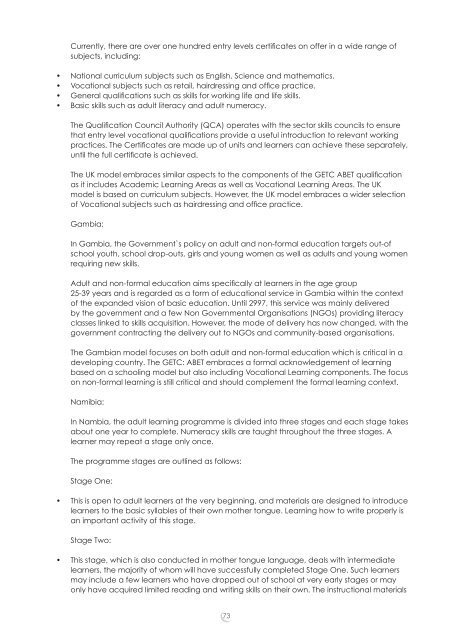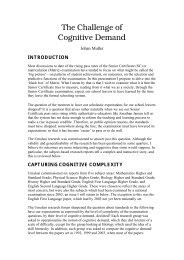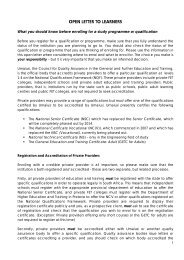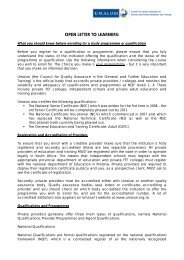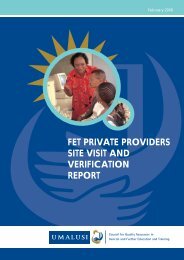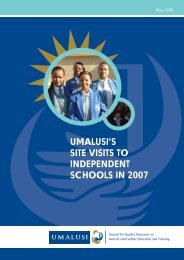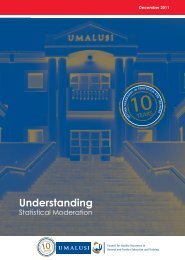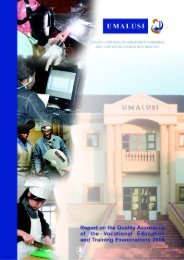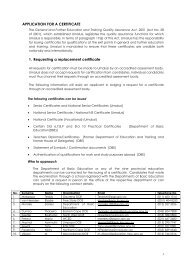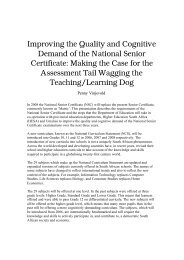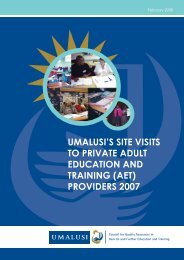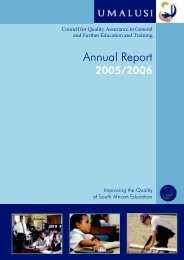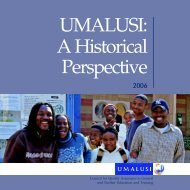Inspecting the Foundations - Umalusi
Inspecting the Foundations - Umalusi
Inspecting the Foundations - Umalusi
You also want an ePaper? Increase the reach of your titles
YUMPU automatically turns print PDFs into web optimized ePapers that Google loves.
Currently, <strong>the</strong>re are over one hundred entry levels certifi cates on offer in a wide range ofsubjects, including:• National curriculum subjects such as English, Science and ma<strong>the</strong>matics.• Vocational subjects such as retail, hairdressing and offi ce practice.• General qualifi cations such as skills for working life and life skills.• Basic skills such as adult literacy and adult numeracy.The Qualifi cation Council Authority (QCA) operates with <strong>the</strong> sector skills councils to ensurethat entry level vocational qualifi cations provide a useful introduction to relevant workingpractices. The Certifi cates are made up of units and learners can achieve <strong>the</strong>se separately,until <strong>the</strong> full certifi cate is achieved.The UK model embraces similar aspects to <strong>the</strong> components of <strong>the</strong> GETC ABET qualifi cationas it includes Academic Learning Areas as well as Vocational Learning Areas. The UKmodel is based on curriculum subjects. However, <strong>the</strong> UK model embraces a wider selectionof Vocational subjects such as hairdressing and offi ce practice.Gambia:In Gambia, <strong>the</strong> Government`s policy on adult and non-formal education targets out-ofschool youth, school drop-outs, girls and young women as well as adults and young womenrequiring new skills.Adult and non-formal education aims specifi cally at learners in <strong>the</strong> age group25-39 years and is regarded as a form of educational service in Gambia within <strong>the</strong> contextof <strong>the</strong> expanded vision of basic education. Until 2997, this service was mainly deliveredby <strong>the</strong> government and a few Non Governmental Organisations (NGOs) providing literacyclasses linked to skills acquisition. However, <strong>the</strong> mode of delivery has now changed, with <strong>the</strong>government contracting <strong>the</strong> delivery out to NGOs and community-based organisations.The Gambian model focuses on both adult and non-formal education which is critical in adeveloping country. The GETC: ABET embraces a formal acknowledgement of learningbased on a schooling model but also including Vocational Learning components. The focuson non-formal learning is still critical and should complement <strong>the</strong> formal learning context.Namibia:In Nambia, <strong>the</strong> adult learning programme is divided into three stages and each stage takesabout one year to complete. Numeracy skills are taught throughout <strong>the</strong> three stages. Alearner may repeat a stage only once.The programme stages are outlined as follows:Stage One:• This is open to adult learners at <strong>the</strong> very beginning, and materials are designed to introducelearners to <strong>the</strong> basic syllables of <strong>the</strong>ir own mo<strong>the</strong>r tongue. Learning how to write properly isan important activity of this stage.Stage Two:• This stage, which is also conducted in mo<strong>the</strong>r tongue language, deals with intermediatelearners, <strong>the</strong> majority of whom will have successfully completed Stage One. Such learnersmay include a few learners who have dropped out of school at very early stages or mayonly have acquired limited reading and writing skills on <strong>the</strong>ir own. The instructional materials73


